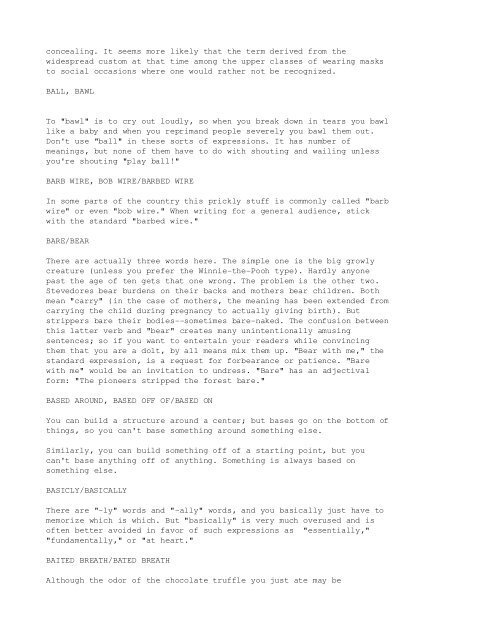Common_Errors_in_English_usage
Common_Errors_in_English_usage
Common_Errors_in_English_usage
You also want an ePaper? Increase the reach of your titles
YUMPU automatically turns print PDFs into web optimized ePapers that Google loves.
conceal<strong>in</strong>g. It seems more likely that the term derived from the<br />
widespread custom at that time among the upper classes of wear<strong>in</strong>g masks<br />
to social occasions where one would rather not be recognized.<br />
BALL, BAWL<br />
To "bawl" is to cry out loudly, so when you break down <strong>in</strong> tears you bawl<br />
like a baby and when you reprimand people severely you bawl them out.<br />
Don't use "ball" <strong>in</strong> these sorts of expressions. It has number of<br />
mean<strong>in</strong>gs, but none of them have to do with shout<strong>in</strong>g and wail<strong>in</strong>g unless<br />
you're shout<strong>in</strong>g "play ball!"<br />
BARB WIRE, BOB WIRE/BARBED WIRE<br />
In some parts of the country this prickly stuff is commonly called "barb<br />
wire" or even "bob wire." When writ<strong>in</strong>g for a general audience, stick<br />
with the standard "barbed wire."<br />
BARE/BEAR<br />
There are actually three words here. The simple one is the big growly<br />
creature (unless you prefer the W<strong>in</strong>niethePooh type). Hardly anyone<br />
past the age of ten gets that one wrong. The problem is the other two.<br />
Stevedores bear burdens on their backs and mothers bear children. Both<br />
mean "carry" (<strong>in</strong> the case of mothers, the mean<strong>in</strong>g has been extended from<br />
carry<strong>in</strong>g the child dur<strong>in</strong>g pregnancy to actually giv<strong>in</strong>g birth). But<br />
strippers bare their bodiessometimes barenaked. The confusion between<br />
this latter verb and "bear" creates many un<strong>in</strong>tentionally amus<strong>in</strong>g<br />
sentences; so if you want to enterta<strong>in</strong> your readers while conv<strong>in</strong>c<strong>in</strong>g<br />
them that you are a dolt, by all means mix them up. "Bear with me," the<br />
standard expression, is a request for forbearance or patience. "Bare<br />
with me" would be an <strong>in</strong>vitation to undress. "Bare" has an adjectival<br />
form: "The pioneers stripped the forest bare."<br />
BASED AROUND, BASED OFF OF/BASED ON<br />
You can build a structure around a center; but bases go on the bottom of<br />
th<strong>in</strong>gs, so you can't base someth<strong>in</strong>g around someth<strong>in</strong>g else.<br />
Similarly, you can build someth<strong>in</strong>g off of a start<strong>in</strong>g po<strong>in</strong>t, but you<br />
can't base anyth<strong>in</strong>g off of anyth<strong>in</strong>g. Someth<strong>in</strong>g is always based on<br />
someth<strong>in</strong>g else.<br />
BASICLY/BASICALLY<br />
There are "ly" words and "ally" words, and you basically just have to<br />
memorize which is which. But "basically" is very much overused and is<br />
often better avoided <strong>in</strong> favor of such expressions as "essentially,"<br />
"fundamentally," or "at heart."<br />
BAITED BREATH/BATED BREATH<br />
Although the odor of the chocolate truffle you just ate may be





